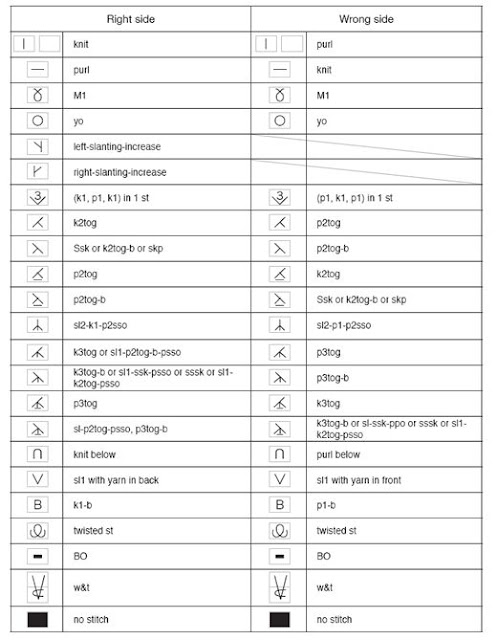This knitting pattern contains 10 different knitting techniques. They are:
Declamation: The pattern and chart were collected from avercheva.ru. I do not own any of these pattern. I have just transformed it into a written form.
- Knit (K)
- Purl (P)
- K2tog (Knit 2 stitches together)
- P2tog (Purl 2 stitches together)
- Yarn over
- Ktbl (Knit through back loop)
- Ptbl (Purl through back loop)
- SSK (Slip-Slip-Knit; slip 2 stitches separately on right needle knit-wise, transfer on left needle, knit through back loop)
- SSP (Slip-Slip-Purl; slip 2 stitches separately on right needle knit-wise, transfer on left needle, purl through back loop)
- Wraped stitch (Slip 5 stitches as if to purl into cable needle, wrap working yarn anti clockwise around the slipped stitches 3 times; k2, p1, k2 from the cable needle)
Note: All odd rows = Right side (RS) rows, even rows = Wrong side (WS) rows. Blank/empty box means Purl on RS, Knit on WS. On row 22 and 26 (both WS), the colored box means k1tbl (though on WS it should be done as P1tbl. It is an exception). On row 23, the colored 5 boxes represent wrapped stitch. Please check the symbol list and abbreviation if you prefer following the chart.
Instruction:
Cast on multiple of 16+1 stitches; Repeat row 1-32
(Repeat in between ** as many times as required)
Odd rows = RS, even rows = WS
Cast on multiple of 16+1 stitches; Repeat row 1-32
Odd rows = RS, even rows = WS
Row 1: *(p1, k1tbl)*, p1
Row 2: *(k1, p1tbl)*, k1
Row 3: *p1, yo, (k1tbl, p1) 2 times, k1tbl, k2tog, p1, ssk, (k1tbl, p1) 2
times, k1tbl, yo*, p1
Row 4: *k1, p1, (p1tbl, k1) 2 times, p1tbl, p1, k1, p1, (p1tbl, k1) 2 times,
p1tbl, p1*, k1
Row 5: *p1, k1, yo, (k1tbl, p1) 2 times, k2tog, p1, ssk, (p1, k1tbl) 2
times, yo, k1*, p1
Row 6: *k1, p2, (p1tbl, k1) 2 times, p1, k1, p1, (k1, p1tbl) 2 times, p2*,
k1
Row 7: *p1, k2, yo, k1tbl, p1, k1tbl, k2tog, p1, ssk, k1tbl, p1, k1tbl, yo,
k2*, p1
Row 8: *k1, p3, p1tbl, k1, p1tbl, p1, k1, p1, p1tbl, k1, p1tbl, p3*, k1
Row 9:*p1, k3, yo, k1tbl, p1, k2tog, p1, ssk, p1, k1tbl, yo, k3*, p1
Row 10:*k1, p4, p1tbl, (k1, p1) 2 times, k1, p1tbl, p4*, k1
Row 11: *p1, k4, yo, k1tbl, k2tog, p1, ssk, k1tbl, yo, k4*, p1
Row 12: *k1, p5, p1tbl, p1, k1, p1, p1tbl, p5*, k1
Row 13: *p1, k5, yo, k2tog, p1, ssk, yo, k5*, p1
Row 14: *k1, p7*, k1
Row 15: *p1, ssk, k5, yo, p1, yo, k5, k2tog*, p1
Row 16: *k1, p2tog, p4, yo, k3, yo, p4, ssp*, k1
Row 17: *p1, ssk, k3, yo, k1, p3, k1, yo, k3, k2tog*, p1
Row 18: *k1, p2tog, p2, yo, p2, k3, p2, yo p2, ssp*, k1
Row 19: *p1, ssk, k1, yo, p1, k2, p3, k2, p1, yo, k1, k2tog*, p1
Row 20: *k1, p2tog, yo, k2, p2, k3, p2, k2, yo, ssp* k1
Row 21: *p1, yo, ssk, p2, yo, k1, ssk, p1, k2tog, k1, yo, p2, k2tog, yo* p1
Row 22: *k1, p2, k2, k1tbl,
p2, k1, p2, k1tbl,
k2, p2*, k1
Row 23: *p1, k1tbl, yo, ssk, p2, (sl 5 st onto cable needle as if to purl,
wrap yarn anti clockwise around slipped sts 3 times, k2, p1, k2 from cable
needle), p2, k2tog, yo, k1tbl* p1
Row 24: *k1, p1tbl, k1, p1, k2, p2, k1, p2, k2, p1, k1, p1tbl*, k1
Row 25: *p1, k1tbl, p1, yo, ssk, k2tog, k1, yo, p1, yo, k1, ssk, k2tog, yo,
p1, k1tbl*, p1
Row 26: *k1, p1tbl, k1, p4, k1tbl, k1, k1tbl,
p4, k1, p1tbl*, k1
Row 27: *(p1, k1tbl) 2 times, yo, ssk, k1, p3, k1, k2tog, yo, k1tbl, p1,
k1tbl*, p1
Row 28: *(k1, p1tbl) 2 times, k1, p2, k3, p2, (k1, p1tbl) 2 times *, k1
Row 29: *(p1, k1tbl) 2 times, p1, yo, ssk, p3, k2tog, yo, (p1, k1tbl) 2
times*, p1
Row 30: *(k1, p1tbl) 2 times, k1, p2, k3, p2, (k1, p1tbl) 2 times*, k1
Row 31: *(p1, k1tbl) 3 times, yo, ssk, p1, k2tog, yo, k1tbl, (p1, k1tbl) 2
times*, p1
Row 32: *(k1, p1tbl) 3 times, (k1, p1) 2 times, k3, p1tbl, k1 p1tbl*, k1Declamation: The pattern and chart were collected from avercheva.ru. I do not own any of these pattern. I have just transformed it into a written form.

